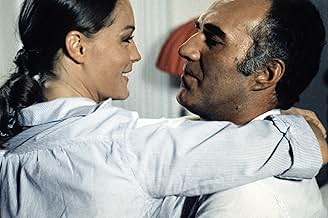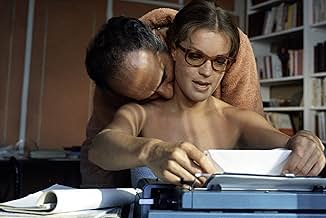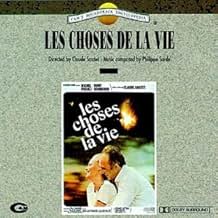Les choses de la vie
- 1970
- Tous publics
- 1h 29min
NOTE IMDb
7,4/10
5,9 k
MA NOTE
Un architecte est victime d'un accident de voiture, après lequel, inconscient, il se remémore les évènements de sa vie qui ont mené à l'accident.Un architecte est victime d'un accident de voiture, après lequel, inconscient, il se remémore les évènements de sa vie qui ont mené à l'accident.Un architecte est victime d'un accident de voiture, après lequel, inconscient, il se remémore les évènements de sa vie qui ont mené à l'accident.
- Réalisation
- Scénario
- Casting principal
- Récompenses
- 1 victoire et 2 nominations au total
Avis à la une
While it's hardly the only film to have ever played with a non-linear narrative, still it takes a little bit to get a grasp on the proceedings as they go back and forth, and requires active viewership. With this in mind the tack is especially useful for 'Les choses de la vie' as at its core the story is relatively simple - simple, but nonetheless engaging and enjoyable. Even setting aside the hops to and fro in time I take issue somewhat with the sequencing insofar as it initially lends to a sense that the picture is having a hard time finding the right tone; I think another imperfection also rears its head in a few instances of dialogue that are better at conveying a broad mood than specifically speaking to characters' relationships or goings-on. For any idiosyncrasies or subjective faults, however, by and large the finished product is quite good - and in fact in the latter half the same sequencing that marks some roughness in earlier scenes is essential in producing the sparks of brilliance in later ones that help to elevate the movie to another level.
Framed in no small part as recollections and flashbacks following an accident, the picture is a loose but calculated portrait of a man figuring out what he wants in life, and the drama and tragedy that upend it. As such the film relies heavily on the strength of Claude Sautet's direction, and even more so on the performances of the cast. The acting is restrained yet characterized by controlled, nuanced range and emotional depth, tact and subtlety that comes across even where voiceover is employed. Michel Piccoli, Lea Massari, and Romy Schneider are all excellent, and audiences would certainly expect no less from them; those in smaller supporting parts are just as swell, though, in breathing life into the tableau. If more significant in select bits and pieces, Jean Boffety's cinematography and even more so Jacqueline Thiédot's editing are terrific, sharp and shrewd in heightening the impact of some moments, or in the latter half being a substantial source of it as the sounds of urgency are painfully contrasted with far brighter imagery.
In all other regards 'Les choses de la vie' is wonderfully well done, including not least the sparing but exquisite original music of Philippe Sarde that lends to the poignancy of the sorry tale. The stunts, effects, and special makeup that dominate in the pivotal car crash are superb, and the feature can claim fantastic production design generally. The costume design, hair, and makeup are lovely across the board. And, yes, I think the writing is uneven in terms of the approximate second half carrying the overwhelming majority of the meaningful weight of the story, while earlier scenes are mildly insufficient to that same end. Be that as it may, more than not the screenplay proves itself over time: characters and the relationships between them are given all the definition they require to round out careful scene writing, and the meticulous construction of the narrative is just as if not more important than the beats themselves to letting its gravity ring out. The film may not be flawless, but for what it does well, it more than compensates for any perceived issues.
When all is said and done the title is more compelling and satisfying than I was ready to give it credit for at first; the value may be primarily shifted to the back end, but it's very much worth it. All the same I don't know if I'd go so far as to say that Sautet's movie is an outright must-see, unless perhaps one is a big fan of someone involved - but it still stands as a fine testament to the skills and intelligence of all on hand. Well made all around, ultimately the writing and editing actually leap out just as much as the acting and direction does from the get-go, and marginal imbalance is easily forgiven. If you have the chance to watch, 'Les choses de la vie' is a great drama that's worth checking out.
Framed in no small part as recollections and flashbacks following an accident, the picture is a loose but calculated portrait of a man figuring out what he wants in life, and the drama and tragedy that upend it. As such the film relies heavily on the strength of Claude Sautet's direction, and even more so on the performances of the cast. The acting is restrained yet characterized by controlled, nuanced range and emotional depth, tact and subtlety that comes across even where voiceover is employed. Michel Piccoli, Lea Massari, and Romy Schneider are all excellent, and audiences would certainly expect no less from them; those in smaller supporting parts are just as swell, though, in breathing life into the tableau. If more significant in select bits and pieces, Jean Boffety's cinematography and even more so Jacqueline Thiédot's editing are terrific, sharp and shrewd in heightening the impact of some moments, or in the latter half being a substantial source of it as the sounds of urgency are painfully contrasted with far brighter imagery.
In all other regards 'Les choses de la vie' is wonderfully well done, including not least the sparing but exquisite original music of Philippe Sarde that lends to the poignancy of the sorry tale. The stunts, effects, and special makeup that dominate in the pivotal car crash are superb, and the feature can claim fantastic production design generally. The costume design, hair, and makeup are lovely across the board. And, yes, I think the writing is uneven in terms of the approximate second half carrying the overwhelming majority of the meaningful weight of the story, while earlier scenes are mildly insufficient to that same end. Be that as it may, more than not the screenplay proves itself over time: characters and the relationships between them are given all the definition they require to round out careful scene writing, and the meticulous construction of the narrative is just as if not more important than the beats themselves to letting its gravity ring out. The film may not be flawless, but for what it does well, it more than compensates for any perceived issues.
When all is said and done the title is more compelling and satisfying than I was ready to give it credit for at first; the value may be primarily shifted to the back end, but it's very much worth it. All the same I don't know if I'd go so far as to say that Sautet's movie is an outright must-see, unless perhaps one is a big fan of someone involved - but it still stands as a fine testament to the skills and intelligence of all on hand. Well made all around, ultimately the writing and editing actually leap out just as much as the acting and direction does from the get-go, and marginal imbalance is easily forgiven. If you have the chance to watch, 'Les choses de la vie' is a great drama that's worth checking out.
French films are famous for their depiction of minor incidents which converge at a larger point to make up the most of what happens in the lives of people. This helps viewers to have a better idea of protagonists' lives. French director Claude Sautet chose to base his film on this premise as he films the personal as well as professional lives of a successful yet unhappy man. From a career point of view, actor Michel Piccoli is shown as somebody doing well in life as he is appreciated by everybody around him. However, his personal life is in turmoil as he is unable to decide between his wife and his mistress. As he is about to solve this dilemma, a tragedy unfolds in his life. This is hardly the description of an original story but what makes the film interesting is how it has been shot. Apart from describing in detail minor incidents related to the lives of protagonists, Claude Sautet has used all his imagination to film the accident scene which occupies a large part of this film's screen space. Finally, once the film is over, some viewers might be tempted to call it the most important moment of the film.
It is an experience. Rush, subtle, delicate and strange. A form of catharsis and source of restless questions.
It is a beautiful film but not as aesthetic show or as object of loisir. In fact, it is a definition of life, social relations, ambiguity of love and search of happiness beyond classical definitions or Freudian symbols.
In each life important it is pieces of puzzle. The respect for game rules, the science to be the favorite image of the other, the words as sentimental trap, the desire as essence of duty.
For everybody the role of axis in family, society, hate or respect, expectations and illusions is more relevant than interior life. So, the masks are only way to be answer to expectations of other.
It is a splendid film for the acting of Romy Schneider and Michel Piccoli.
For the Sautet mark.
For dialogs and lights, for powerful suggestion art, for its message and definition of second life, for atmosphere and delicate art of existence sense discovery. About last hours and projection of lost world. About final silence and about shadows of the others. About structure of hope.
It is a beautiful film but not as aesthetic show or as object of loisir. In fact, it is a definition of life, social relations, ambiguity of love and search of happiness beyond classical definitions or Freudian symbols.
In each life important it is pieces of puzzle. The respect for game rules, the science to be the favorite image of the other, the words as sentimental trap, the desire as essence of duty.
For everybody the role of axis in family, society, hate or respect, expectations and illusions is more relevant than interior life. So, the masks are only way to be answer to expectations of other.
It is a splendid film for the acting of Romy Schneider and Michel Piccoli.
For the Sautet mark.
For dialogs and lights, for powerful suggestion art, for its message and definition of second life, for atmosphere and delicate art of existence sense discovery. About last hours and projection of lost world. About final silence and about shadows of the others. About structure of hope.
By watching this 1969 movie, I have just confirmed my opinion about Claude Sautet: that's one Director that takes the expectator "inside the scene" (As seen in his latest work: Nelly and Mr.Arnaud). He has this ability that allows him to "extract" the most of his characters in the psychologic aspect, by showing all the range of their feelings...Take the scene where Pierre Berard (portrayed by Michel Piccoli) tells Héléne (played by Romy Schneider) of his sudden decision of no longer accompany her on a trip planned ages ago. Another scene that worths appears in a record as a "Death Scenes Hall of Fame" is the one in which Pierre lays on the grass, his thoughs exposed as the expectator follows him, in all his emotional suffering. Claude Sautet: a Director that deserves having his name written in the "Hall of Fame of the Greatest Directors of All Times". As an "homage" to him, in a scale of 10, I grade this film 9.
10rutel
Yesterday (Dec 15, 2001 I saw "Intersection" (with Richard Gere and Sharon Stone), so, I immediately wanted to see the original and ... there is no place like home. I went to a Blockbuster and, once again, the original is much better. Try to see it and you wont regret
Le saviez-vous
- AnecdotesCigarette count: 46
- GaffesIn the car crash scene, the stunt double for Michel Piccoli is seen wearing brown gloves in close-ups. However Piccoli is bare-handed while driving.
- ConnexionsFeatured in Claude Sautet ou La magie invisible (2003)
Meilleurs choix
Connectez-vous pour évaluer et suivre la liste de favoris afin de recevoir des recommandations personnalisées
- How long is The Things of Life?Alimenté par Alexa
Détails
Box-office
- Montant brut aux États-Unis et au Canada
- 5 063 $US
- Montant brut mondial
- 5 063 $US
- Durée1 heure 29 minutes
- Mixage
- Rapport de forme
- 1.66 : 1
Contribuer à cette page
Suggérer une modification ou ajouter du contenu manquant

Lacune principale
By what name was Les choses de la vie (1970) officially released in India in English?
Répondre




























